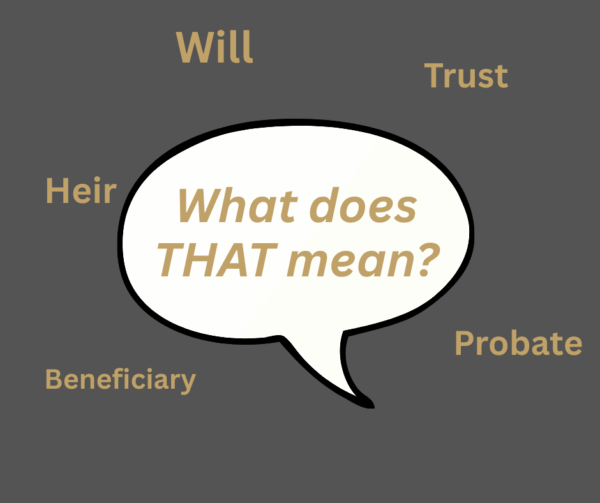Estate planning is full of jargon and look-alike terms that can trip people up. A few small words can make a big difference. Here’s a plain-English guide to the ones clients mix up the most.
Will vs. Living Will
Will (Last Will and Testament): Your after-death instructions, who gets what, and who serves as your Personal Representative (what a lot of states call an “executor”).
Living Will: Your medical treatment preferences if you can’t speak for yourself (e.g., life-prolonging measures in terminal or end-stage conditions).
Key difference: A will speaks after death; a living will speaks during life.
Power of Attorney vs. Executor/Personal Representative
Power of Attorney (POA): You name an agent to handle financial/legal matters while you’re alive. Authority ends at death.
Executor/Personal Representative: The person named in your will and appointed by the court to administer your estate after death.
Key difference: POA during life; Personal Representative after death. (Florida uses “Personal Representative.”)
Trust vs. Will
Will: Takes effect at death and generally goes through probate.
Trust: Can take effect now (once funded). Assets titled to a trust typically avoid probate, saving time, cost, and publicity.
Key difference: A will is probate-based; a properly funded trust can bypass probate.
Revocable Trust vs. Irrevocable Trust
Revocable: You keep control and can amend or revoke during life.
Irrevocable: Generally, can’t be changed; you give up control but may gain asset-protection and tax benefits.
Key difference: Flexibility vs. protection.
Beneficiary vs. Heir
Beneficiary: A person or entity you name (on a trust, life insurance, IRA, etc.).
Heir: The person the law says inherits if you don’t make a valid plan.
Key difference: Beneficiaries are chosen by you; heirs are defined by law.
Probate vs. Non-Probate Assets
Probate assets: In your name alone without a beneficiary designation (e.g., a solely titled account or home). These pass under your will and through the court process.
Non-probate assets: Pass by contract or title (e.g., life insurance with a beneficiary, pay-on-death accounts, assets titled to a trust, or property held with survivorship).
Key difference: Probate requires court involvement; non-probate transfers outside probate.
Joint Tenancy vs. Tenancy in Common
Joint Tenancy with Right of Survivorship: A deceased owner’s share passes automatically to the survivor(s), regardless of the will.
Tenancy in Common: Each owner’s share is separate and can be left to their own beneficiaries.
Key difference: Automatic survivorship vs. inheritable shares.
Estate Tax vs. Inheritance Tax (and a Florida note)
Estate tax: Assessed on the estate before distribution. In 2025, the federal exemption is $13.99 million per individual ($27.98 million per married couple). Most estates are below this threshold.
Inheritance tax: Paid by the recipient in a few states, not Florida. Florida has no state estate or inheritance tax.
Quick takeaway
• A will and a living will do different jobs.
• POA power ends at death; the Personal Representative begins then.
• Funding a revocable trust is how you actually avoid probate.
• Naming beneficiaries (and keeping them updated) is just as important as signing documents.
Not sure which documents you need, or how these terms apply to your family? Let’s talk. A short conversation can prevent long delays (and big headaches) later.
Heidi S. Webb, Attorney at Law, proudly serves clients in Daytona Beach, Ormond Beach, Port Orange, and beyond with compassionate and comprehensive estate planning services. Let’s work together to protect what matters most to you. Contact her today to schedule a free consultation. Visit her page on Facebook, or see what her clients are saying to learn more about Heidi.




